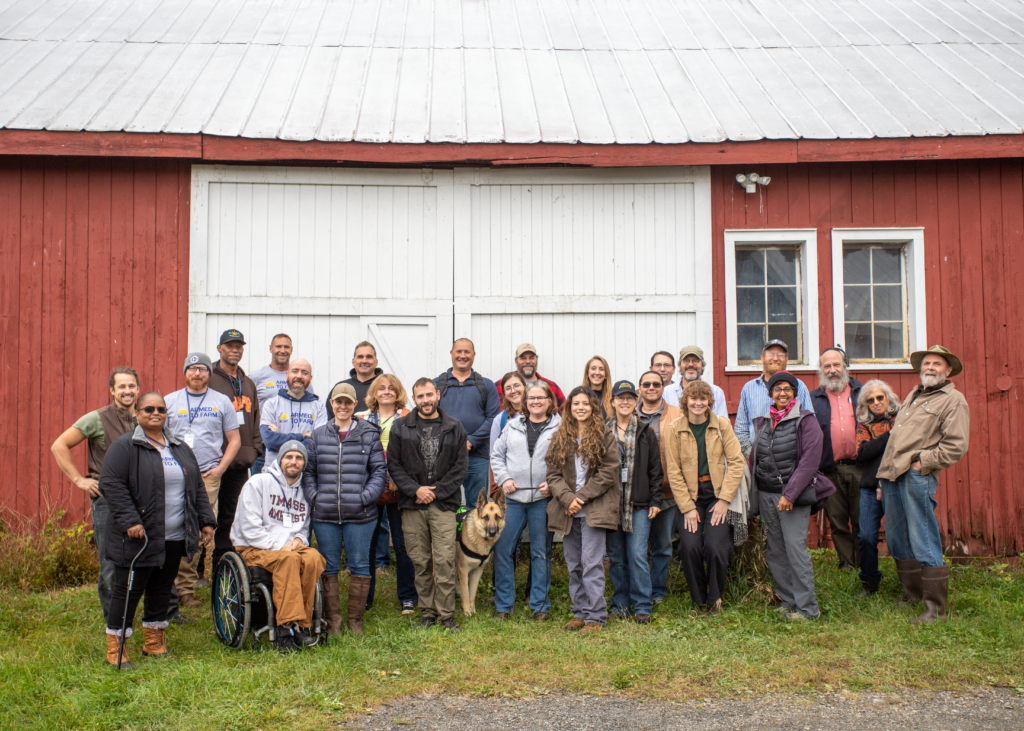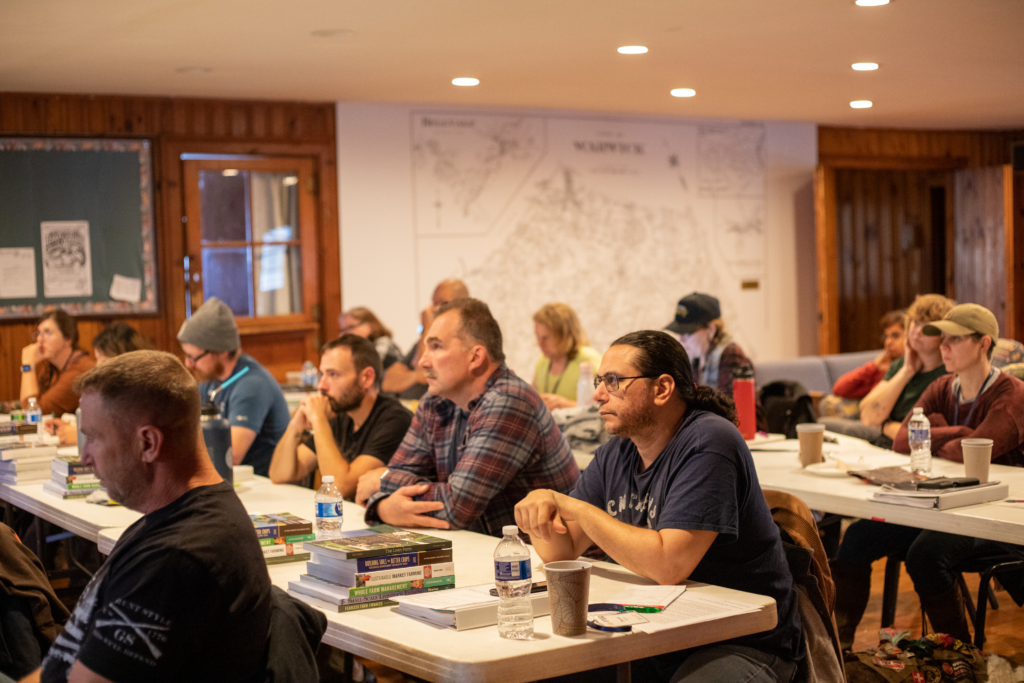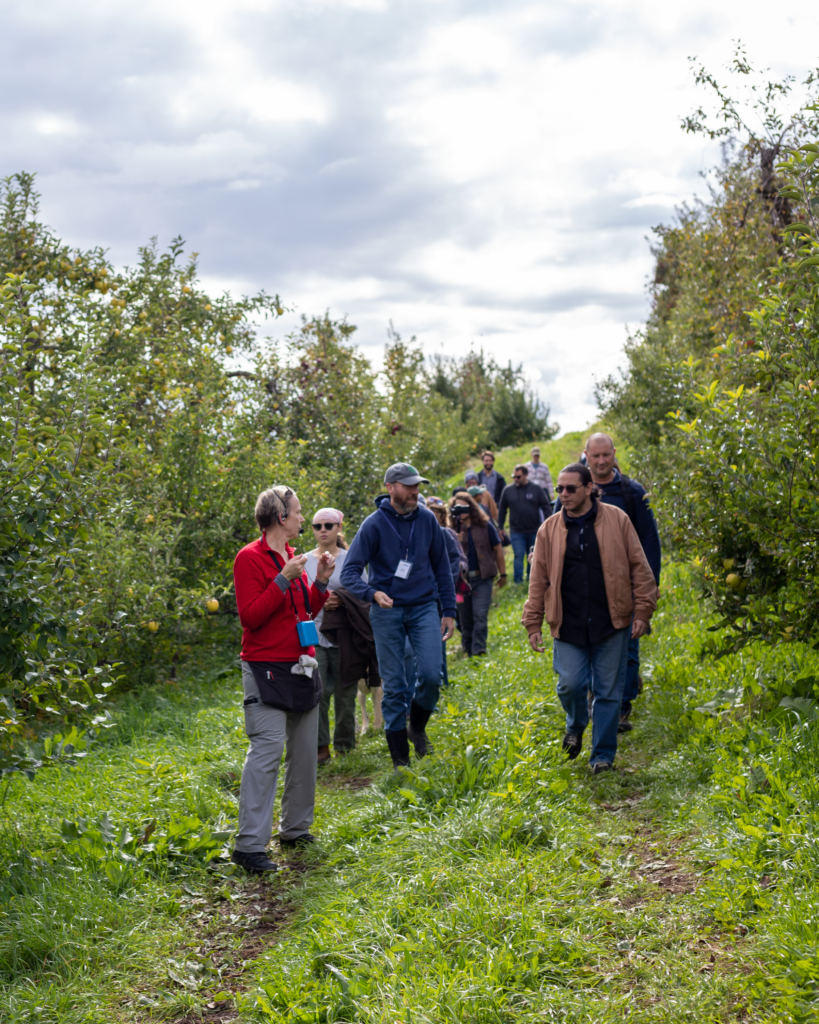Agricultural Basic Training for Farmers
Armed to Farm returns to New York State to again assist veterans explore careers in agriculture.
“I’m a veteran, and I want to be a farmer!” This statement comes in emails and voicemails to the Cornell Small Farms Program staff on a frequent basis. In different stages of transition out of military service, each veteran considers farming from a unique perspective. We work out of offices in central NY, imposing challenges to assisting veterans throughout the state.
Farm Ops, our project for veterans in agriculture, met that challenge by collaborating with the National Center for Appropriate Technology (NCAT) and sponsoring a week long, in-person training event for veterans called Armed to Farm.

An immediate sense of camaraderie was felt among the cohort of veterans as their eyes lit up knowing that they all shared two common grounds: their military backgrounds as well as their desire to dive into agriculture.
During mid-October in the Hudson Valley, simultaneous with prime leaf-peeping season, 17 veterans gathered to explore agricultural ventures in a camp like setting. No sleeping in at Armed to Farm. You have to be up early if you want to eat chow. “Physical training is optional”,a voice says at breakfast that first morning, which brought smiles and laughter around the table.

The cohort of farmer veterans learned about agricultural concepts and resources in the classroom during the morning hours.
Attracted to the idea of a veteran focused training, Marine Corps veteran, Rich Mattingly, signed up for Armed to Farm to kickstart his farm planning and learn more about developing a profitable and sustainable farm business.
“For me personally, I’m able to relax when I am around other veterans, who I know have similar experiences to myself,” Rich said, “and there is a little bit of an instant camaraderie, a bond between us that helps me absorb the information a little bit better than I’ve been able to do at other workshops that I’ve attended.”
All too familiar with the classroom setting, veterans spent each morning in learning sessions with agricultural specialist and educators from local and regional Cornell CooperativeExtensions; USDA, NRCS, and FSA representatives, and a senior staff attorney from the National Agriculture Law Center, along with several other presenters.Class sessions on whole farm planning and legal aspects of farming made an impact.
“Legal was huge for me,” one farmer veteran shared.“Definitely has me thinking differently about how to get started, as it really highlighted the importance of treating the farm as a business.”
When asked about the structure of the week with classroom learning combined with farm visits in the afternoon, Rich commented that the points would not have been driven home quite the same way without seeing the practical application during the farm visits. Always the highlight of an Armed to Farm experience, afternoon farm tours provide the opportunity to talk to farmers, ask questions and explore that farmer’s operations.
To optimize the veteran experience Farm Ops veteran associate, Bailey Colvin, sought out farms that would provide examples of how to implement the concepts learned during morning classroom sessions.
“To provide an optimal training experience, we knew that the farm visits had to compliment the classroom sessions as much as possible,” Bailey explained.
During the week, the cohort had the opportunity to visit seven diverse agricultural operations. Ranging from dairies, pigs, vegetable farms, and an agricultural center that leases land to those interested in farming but otherwise do not have access to land of their own. Many veterans curious about careers in agriculture had several ideas in mind before attending the week-long event. Seeing this range of farms provided some time for exploring and decision-making.

After classroom learning in the morning, the cohort then visited farms in the afternoon that have been practicing said concepts.
“That’s been really beneficial to me to see real working farmers applying some of these concepts,” Rich said. “Whether it’s soil health or livestock management in real time, that’s something I know that I can take back and apply these lessons at my own small farm.”
Always a special occurrence, this Armed to Farm coordinated a visit to the farm of a farmer veteran. All Family Farm, actual military owned and operated Berkshire pig farm in Middletown, NY, provided a tour of their beautifully maintained farm and shared lessons learned from their four years of experience in farrowing, raising, and finishing their pigs.
Nathan and Misty Allanach first conceptualized the idea of farming in 2018 and established the farm in 2019. Nathan spoke about being passionate in providing to “my community, my children, my grandchildren, something that is pure”. Dedicated to the humane treatment of animals, “we have to respect these animals if we are going to be consuming them, because they are being sacrificed for us,” Nathan stated solemnly.
“My favorite part of Armed to Farm has definitely been the farm visits,” said Army veteran Garrett Fields. Garrett found Nathan and Misty’s passion for raising pigs humanely and providing quality meat to their communities inspiring. Garrett hopes to have animals on his property and work along with his children to take care of them.
Garret’s farming journey began with he and his daughter watching YouTube videos of people who were raising Alpacas.
“It became an every night thing,” Garrett explained. “Then she saw a video on chickens, so we decided to get chickens and sell the eggs (when we could if we hadn’t eaten them all already). I then began to get interested in honeybees and have since purchased 2 colonies and established a 3rd Nuc”.
When asked what advice he would give aspiring farmer veterans, Garrett recommended: “For any veteran getting into agriculture, you really have to leverage all of the opportunities that are out there and actually use them.”
Farmer veterans were able to literally get their hands dirty in the famous Black Dirt Region of the Hudson Valley at the Chester Agricultural Center. Providing these combined experiences of the classroom, farm tours and hands on task stakes a considerable amount of time and coordination.
NCAT and Farm Ops staff worked for 10 months to plan and coordinate the event. Navy veteran and Sustainable Agriculture Specialist Lee Rinehart has worked for NCAT for 18 years supporting Armed to Farm events around the U.S.. More than 1100 veterans have been served by the program since its inception in 2013, and Lee attributes the success of the Armed to Farm program to the veterans he serves.
“When you bring a cohort of veterans together for an intense week of training and on-farm experiences, they bond almost immediately,”Lee noted. “They are motivated and come with common interests and experiences. They are serious about a farm lifestyle but moreover they are passionate about making a difference in their own communities.”

